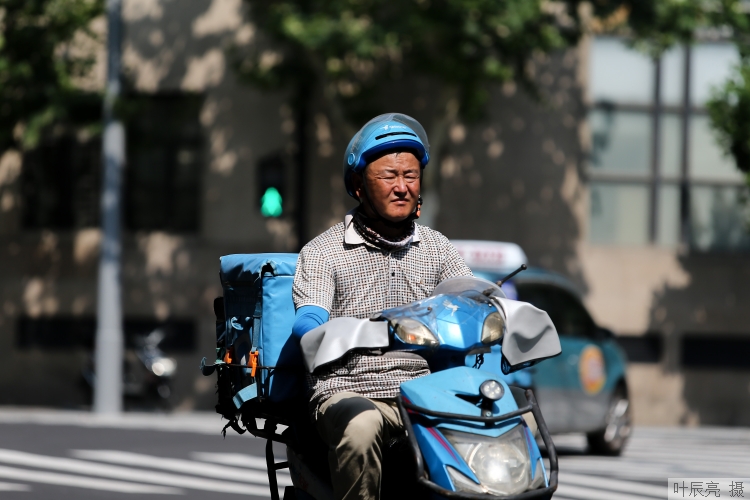
Shencheng entered the "roasting" mode.
The hottest day of the year has come! In the past two days, most parts of the country were scorched by the scorching sun. In Shanghai, the temperature also went up all the way, from 33℃, 35℃ and all the way to 38℃, and the outdoor high-temperature barbecue mode was started. With the continuous high-temperature weather, the incidence of heatstroke also increased. Recently, a middle-aged man in Huizhou, Guangdong Province suffered from heatstroke and his body temperature approached 42℃, and he died after being rescued. In this regard, the doctor once again reminded:In high temperature environment, if you have sweating, thirst, chest tightness, dizziness, nausea, limb weakness and numbness, you must pay attention to it. You may have heatstroke, so don’t "carry it hard".
After sleeping, the topic of heatstroke has become one of the most concerned topics of the public, which is not only uncomfortable, but also may have fatal consequences. Recently, "the man died of heatstroke at a temperature of 42℃" directly boarded the hot search.
"The air humidity increases after falling into the air, coupled with continuous high temperature, which is very prone to heatstroke." Zhou Yong, chief physician of the Department of Internal Medicine of Shanghai Renai Hospital, explained that heatstroke is an acute disease with disorder of body temperature regulation, water electrolysis metabolism and dysfunction of nervous system and circulatory system in an environment with high temperature and high fever and no air circulation. Heatstroke is mainly related to high temperature, direct sunlight, high labor intensity, poor air circulation and other factors. In addition, weak personal constitution, poor nutritional status, excessive fatigue, lack of sleep and obesity are also factors that induce heatstroke.
How to judge whether it is heatstroke? Heatstroke can be divided into premonitory heatstroke, mild heatstroke and severe heatstroke. After heatstroke, there will be a series of disease symptoms from light to heavy. Among them, severe heatstroke can be divided into three types: heat spasm, heat exhaustion and heatstroke.Heat stroke is a particularly serious disease. The patient’s body temperature can be as high as 40℃, and he sweats a lot in the early stage, and then "no sweat", accompanied by different degrees of consciousness disorder, and some may even lead to shock, which can seriously cause coma, liver and kidney failure, and even multiple organ failure. The condition deteriorates rapidly and the mortality rate is extremely high.
So, what should I do if I get heatstroke? Dr. Zhou Yong suggested that,Once you feel heatstroke, you should stop your activities immediately, move to a cool and ventilated place, turn on the electric fan or air conditioner, take off your excess clothes and let your body dissipate heat quickly.; People around you can use cold water or alcohol to help patients wipe their bodies, or use wet towels and cold patches to cool them down.
During this period, patients can take summer medicine, drink more light salt water and mung bean soup to replenish lost body fluids, and closely observe the patient’s situation. If the patient is unconscious, or the symptoms are difficult to relieve or disappear, it may be severe heatstroke. At the same time as taking treatment measures, dial "120" in time to send the patient to the hospital for treatment.
How to prevent heatstroke in hot weather? Since the high temperature can’t be avoided, you should take precautions at ordinary times. Dr. Zhou Yong suggested:When the weather is hot, whether you are thirsty or not, you should drink more water, especially when you sweat a lot, you must replenish water in time; Usually eat more vegetables and fruits with high water content and keep enough sleep;Avoid going out at high temperature. If you can’t avoid it, you should prepare sunscreen and sunscreen, and prepare some medicines for heatstroke prevention and cooling.
Talking about how special people spend the midsummer safely, Director Song He of Shanghai Yuanda Cardiothoracic Hospital found that,Many patients with cardiovascular and cerebrovascular diseases have a misunderstanding. They always think that the blood pressure is the lowest in summer and the symptoms are relatively stable, so they stop taking drugs or change their own medicines without authorization. Actually, it is not. High temperature weather is also a high incidence of cardiovascular diseases, especially when the weather continues to be sultry, human metabolism and blood circulation are obviously accelerated, subcutaneous blood vessels are dilated, blood flow is increased by 3-5 times than usual, and the burden on the heart is aggravated.Secondly, the high temperature in summer makes people sweat a lot, and the body’s water evaporates with sweat in large quantities, causing blood viscosity, which is easy to lead to cardiovascular and cerebrovascular ischemia and even embolism.
In addition, hot weather makes people prone to emotional "heatstroke", irritability and irritability, coupled with factors such as long days and short nights and "discounted sleep quality".Patients are prone to angina pectoris, arrhythmia, cerebral infarction, myocardial infarction, and even sudden death.
Therefore, high temperature weather will also bring challenges to patients with cardiovascular and cerebrovascular diseases. Director Song He reminded us to replenish more water and have a light and balanced diet in the dog days. Patients with chronic diseases such as hypertension, heart disease and diabetes should have regular outpatient check-ups, take medicine strictly according to the doctor’s advice, and do not stop taking medicine without authorization. Cardiovascular patients should avoid overwork and spicy diet, and eat more fresh fruits and vegetables. You should avoid activities at high temperature, pay attention to drinking a glass of water in the morning, reduce blood viscosity, keep proper exercise, and avoid great joy, great sorrow and great anger.
Author: Tang Wenjia
Editor: Wu Jinjiao
Editor in charge: Fan Liping
* The exclusive manuscript of Wenhui, please indicate the source.
关于作者